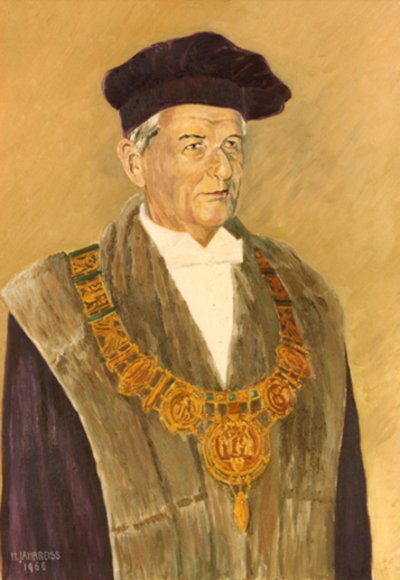Professor Dr. iur. Dr. h.c. Hans Carl Maria Alfons Peters †
(Head of the Institute 1950 – 1965)

Resistance fighter and CDU co-founder
Hans Carl Maria Alfons Peters was born in Berlin on September 5, 1896. After the World War I he first studied mathematics, then law and political science at the universities of Münster, Vienna and Berlin. In Münster, he received his doctorate in 1921 on "Administrative Unlawfulness and Police Unlawfulness and their Relations to General Unlawfulness" and entered the judicial administrative service as a government assistant in 1923. In 1925 he habilitated in Breslau in constitutional and administrative law with a thesis on " Limits of Municipal Self-Government in Prussia," a "Contribution to the Doctrine of the Relationship of Municipalities to the State and the Reich."
Peters then worked in Breslau as an academic lecturer until 1928, when he moved to what is now the Humboldt University in Berlin as an associate professor. In 1932 and 1933 Peters was a deputy of the (democratic) Center Party in the Prussian Parliament. In 1933 he was elected a member of the board of the Catholic Society for the Cultivation of Science (Görres-Gesellschaft zur Pflege der Wissenschaft). In 1940/41 and since 1949 he was also president of this society.
As an opponent of the Nazi regime, Peters supported the "Kreisau Circle," founded by Helmut J. Graf von Moltke and Peter Graf Yorck von Wartenburg, which met in secret meetings beginning in 1938 and whose goal was to prepare for the time of the collapse of the Nazi regime and to develop as concrete ideas as possible about the organization of social life, above all to formulate the constitutional as well as political future of Germany. Unlike other members of this resistance movement, Peters was never discovered. His participation in the Berlin underground group "Onkel Emil," which among other things hid persecuted fellow citizens, also went unnoticed.
After his Catholic and republican-democratic stance stood in his way of a full professorship during the time of the Nazi dictatorship, he became a professor of public law at the former Friedrich Wilhelm University in 1946. At the university, which was now renamed Humboldt University, he was dean of the law faculty and campaigned for the maintenance of this university as well as against the rehabilitation of National Socialist teachers of constitutional law. In this context, he also participated in the Nuremberg Trials.
From 1946-48, he was a CDU member of the Berlin City Council and participated in the drafting of the 1950 constitution of the state of Berlin. Previously, he had been one of the co-founders of the Christian Democratic Union of Germany.
In 1949 he re-founded the Görres Society, of which he was chairman until 1967. In the same year, Peters accepted the appointment as full professor of constitutional and administrative law at University of Cologne and became the founding director of the present Institute of Public and Administrative Law. He was involved in the conclusion of the University Treaty of 1954 and also drafted the University Constitution of 1963. He was elected Dean of the Faculty of Law from 1950-51 and from 1956-57. Hans Peters held the office of Rector of the University of Cologne from 1964-65. From 1952-61 Peters was a member of the Cologne City Council. He was also a member of the Working Group for Research of the State of North Rhine-Westphalia, the Founding Committee of the University of Bochum, the federal Committee of Experts for the Reorganization of the German Territory, the Commission on Party Law and Electoral Law, the Central Committee of German Catholics, and Chairman of the Association of German Teachers of Constitutional Law.
Hans Peters received numerous awards, including the Grand Cross of Merit with Star of the Order of Merit of the Federal Republic of Germany, the Commander's Cross with Star of the Order of St. Gregory, and in 1958 an honorary doctorate from the University of Leuven. He declined a call to the Federal Constitutional Court (Bundesverfassungsgericht) proposed by the CDU parliamentary group with reference to his Cologne duties shortly after changing universities in the early 1950s. He died in Cologne on January 15, 1966.
Further information in English can be found at the German Resistance Memorial Center.